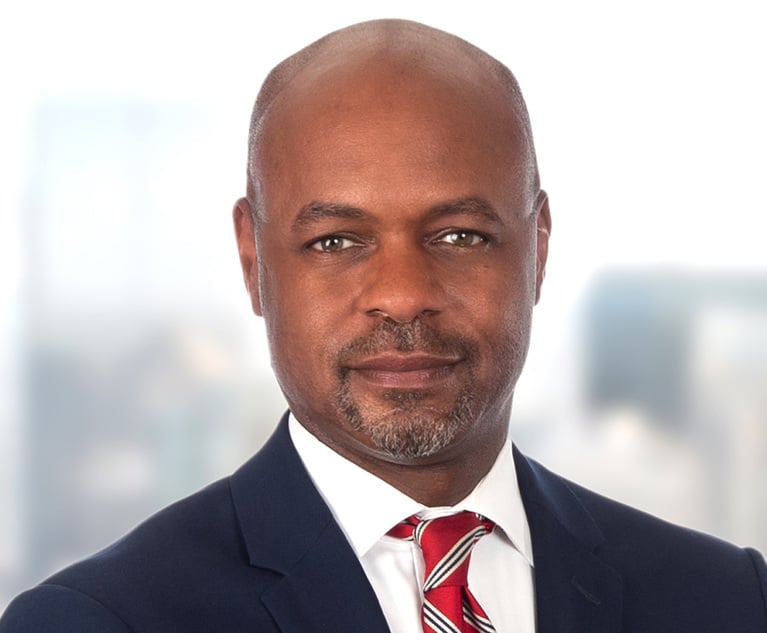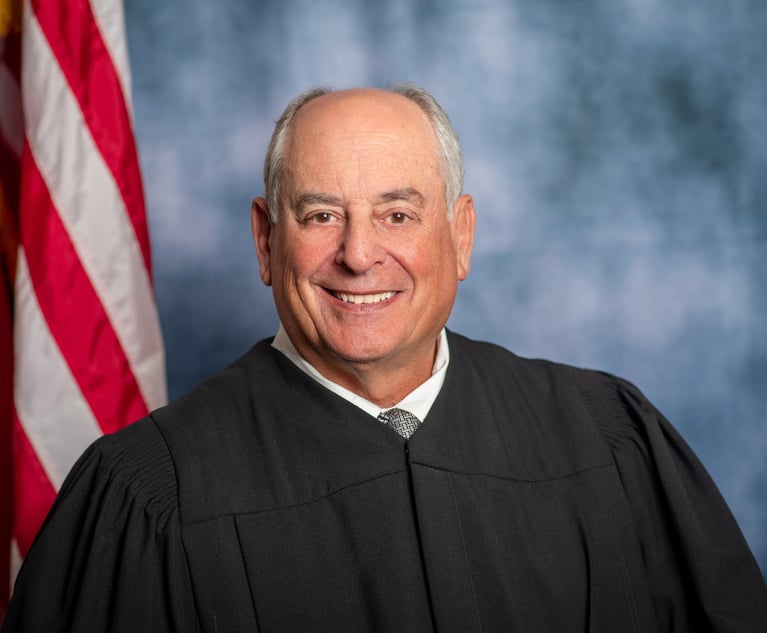 From left, Gerald Weber, and Shean D. Williams of The Cochran Firm in Atlanta.
From left, Gerald Weber, and Shean D. Williams of The Cochran Firm in Atlanta.Civil Rights Lawyers Say Criminal Charges Against Police Remain a 'Unicorn'
Criminal charges against six Atlanta police, who tased students protesting the death of George Floyd, will face multiple hurdles.
June 04, 2020 at 04:26 PM
6 minute read
Two veteran Atlanta civil rights lawyers say that holding police accountable for misconduct are frequently stymied by legal hurdles and a culture that too often protects officers whose conduct would otherwise result in criminal charges.
Even as Fulton County's district attorney filed criminal charges this week against six Atlanta police officers for tazing students amid demonstrations over the death of George Floyd at the hands of Minneapolis police, Atlanta civil rights attorney Gerry Weber said those types of charges remain "as unlikely as seeing a unicorn."
The charges against police in Atlanta and Minneapolis come after more than a week of demonstrations over excessive use of force by police. Criminal charges in both incidents were only filed after recordings of the encounters went viral.
Weber—who has handled multiple civil rights cases lodged against Atlanta police—called criminal charges "a remedy in name only" and predicted that charging police is only the first of numerous hurdles to punish criminal behavior.
"Much depends on whether there will, in fact, be follow-through by the prosecutors," he said. In Atlanta, "The jury is out on whether Paul Howard will walk the length of the road or whether he will just take a few first steps toward a plea."
On Tuesday, shortly after Howard announced the criminal charges against Atlanta officers, Police Chief Erika Shields circulated an internal department email insisting that "criminal charges were never part of any discussion" over the tazings. She said she questioned Howard "both to the appropriateness and the timing of any charges." And she concluded, "This does not mean for a moment that I will sit quietly by and watch our employees swept up in the tsunami of political jockeying during an election year."
Howard is running a contested race for his seventh term as DA.
Weber said it was disturbing "that even in the wake of these deaths across the country, that the department is still not all in on combating excess force within its ranks."
Atlanta attorney Shean Williams, co-chairman of The Cochran Firm's national civil rights group, praised Mayor Keisha Lance Bottoms for firing two of the six officers and commended Howard for bringing criminal charges.
But Williams pointed to a "systemic failure" by the Atlanta police to adopt recommendations of a civil review board created after officers gunned down 92-year-old Kathryn Johnston in her home in 2006 during an illegal drug raid at the wrong address on a no-knock warrant.
Williams and partner Hezekiah Sistrunk represented Johnson's niece, Sarah Dozier, in the civil litigation against the department. Three officers were sentenced to federal prison terms ranging from six to 10 years, and the city settled the civil case for $4.9 million.
Since then, the civilian review board has issued several recommendations calling for officers to be disciplined for excessive use of force and other policy violations, Williams said. As a general rule, the city's police chiefs "have not supported those findings."
Williams said the state's two largest police departments in Atlanta and DeKalb counties also "have not properly trained their officers regarding use of force issues and have not properly disciplined those officers when they have not complied with policies and procedures."
"Most of the policies and procedures in all police departments across this nation are standard," he said. "What is different is whether the person in charge is enforcing these policies and making people accountable. That's the key. … You have to have leadership to hold these officers accountable before you have a George Floyd."
"As a citizen of this city, as a civil rights lawyer, as a black man with a black son, I am very proud of what the mayor has done with this process," Williams said. "I am respectfully asking her to do it for every case in Atlanta. Go back. Look at your files. Look at your police department. Several families are just as affected as the family of George Floyd. … The city needs to step up to the plate and get justice for those families as well."
Both Weber and Williams were critical of qualified immunity, which traditionally shields law enforcement and governments from liability in excessive force cases where victims seek civil damages. Qualified immunity requires that plaintiffs demonstrate the officers accused of excessive force knew they were violating clearly established law when they did so.
U.S. Supreme Court Justice Sonia Sotomayor repeatedly has warned that the courts' "one-sided approach" to qualified immunity—more often protecting police—sends an "alarming signal" to law enforcement and the public.
Veteran prosecutor Pete Skandalakis, now the executive director of the Prosecuting Attorney's Council of Georgia, successfully prosecuted multiple officers during his tenure as a district attorney. Skandalakis said a significant change in a state law four years ago that formerly gave law enforcement officers preferential treatment in grand juries has made prosecuting rogue cops far easier.
For years, when grand juries considered charges against law enforcement, those officers were allowed to sit in on the proceedings and listen to witness testimony, he said. They were then allowed to present unsworn testimony not subject to cross-examination either by prosecutors or grand jurors. In most counties, the law also barred a court reporter from making an official record of the grand jury proceedings.
Similar statutes remain in place in a number of other states, Skandalakis said.
Skandalakis said that one of the challenges of prosecuting police is that most people have a good opinion of law enforcement, "particularly police officers who patrol their community, who they have daily contact with."
There are relatively few cases that attract the kind of public attention generated by George Floyd's death, he said.'
"The public wants to like the police. .,. They recognize it's a hard job." And that gives police officers an advantage in sidestepping a successful prosecution, he said.
This content has been archived. It is available through our partners, LexisNexis® and Bloomberg Law.
To view this content, please continue to their sites.
Not a Lexis Subscriber?
Subscribe Now
Not a Bloomberg Law Subscriber?
Subscribe Now
NOT FOR REPRINT
© 2024 ALM Global, LLC, All Rights Reserved. Request academic re-use from www.copyright.com. All other uses, submit a request to [email protected]. For more information visit Asset & Logo Licensing.
You Might Like
View All
Georgia Supreme Court Honoring Troutman Pepper Partner, Former Chief Justice
2 minute read
'A 58-Year-Old Engine That Needs an Overhaul': Judge Wants Traffic Law Amended
3 minute read
Appeals Court Removes Fulton DA From Georgia Election Case Against Trump, Others
6 minute read
Family of 'Cop City' Activist Killed by Ga. Troopers Files Federal Lawsuit
5 minute readLaw Firms Mentioned
Trending Stories
- 1'Largest Retail Data Breach in History'? Hot Topic and Affiliated Brands Sued for Alleged Failure to Prevent Data Breach Linked to Snowflake Software
- 2Former President of New York State Bar, and the New York Bar Foundation, Dies As He Entered 70th Year as Attorney
- 3Legal Advocates in Uproar Upon Release of Footage Showing CO's Beat Black Inmate Before His Death
- 4Longtime Baker & Hostetler Partner, Former White House Counsel David Rivkin Dies at 68
- 5Court System Seeks Public Comment on E-Filing for Annual Report
Who Got The Work
Michael G. Bongiorno, Andrew Scott Dulberg and Elizabeth E. Driscoll from Wilmer Cutler Pickering Hale and Dorr have stepped in to represent Symbotic Inc., an A.I.-enabled technology platform that focuses on increasing supply chain efficiency, and other defendants in a pending shareholder derivative lawsuit. The case, filed Oct. 2 in Massachusetts District Court by the Brown Law Firm on behalf of Stephen Austen, accuses certain officers and directors of misleading investors in regard to Symbotic's potential for margin growth by failing to disclose that the company was not equipped to timely deploy its systems or manage expenses through project delays. The case, assigned to U.S. District Judge Nathaniel M. Gorton, is 1:24-cv-12522, Austen v. Cohen et al.
Who Got The Work
Edmund Polubinski and Marie Killmond of Davis Polk & Wardwell have entered appearances for data platform software development company MongoDB and other defendants in a pending shareholder derivative lawsuit. The action, filed Oct. 7 in New York Southern District Court by the Brown Law Firm, accuses the company's directors and/or officers of falsely expressing confidence in the company’s restructuring of its sales incentive plan and downplaying the severity of decreases in its upfront commitments. The case is 1:24-cv-07594, Roy v. Ittycheria et al.
Who Got The Work
Amy O. Bruchs and Kurt F. Ellison of Michael Best & Friedrich have entered appearances for Epic Systems Corp. in a pending employment discrimination lawsuit. The suit was filed Sept. 7 in Wisconsin Western District Court by Levine Eisberner LLC and Siri & Glimstad on behalf of a project manager who claims that he was wrongfully terminated after applying for a religious exemption to the defendant's COVID-19 vaccine mandate. The case, assigned to U.S. Magistrate Judge Anita Marie Boor, is 3:24-cv-00630, Secker, Nathan v. Epic Systems Corporation.
Who Got The Work
David X. Sullivan, Thomas J. Finn and Gregory A. Hall from McCarter & English have entered appearances for Sunrun Installation Services in a pending civil rights lawsuit. The complaint was filed Sept. 4 in Connecticut District Court by attorney Robert M. Berke on behalf of former employee George Edward Steins, who was arrested and charged with employing an unregistered home improvement salesperson. The complaint alleges that had Sunrun informed the Connecticut Department of Consumer Protection that the plaintiff's employment had ended in 2017 and that he no longer held Sunrun's home improvement contractor license, he would not have been hit with charges, which were dismissed in May 2024. The case, assigned to U.S. District Judge Jeffrey A. Meyer, is 3:24-cv-01423, Steins v. Sunrun, Inc. et al.
Who Got The Work
Greenberg Traurig shareholder Joshua L. Raskin has entered an appearance for boohoo.com UK Ltd. in a pending patent infringement lawsuit. The suit, filed Sept. 3 in Texas Eastern District Court by Rozier Hardt McDonough on behalf of Alto Dynamics, asserts five patents related to an online shopping platform. The case, assigned to U.S. District Judge Rodney Gilstrap, is 2:24-cv-00719, Alto Dynamics, LLC v. boohoo.com UK Limited.
Featured Firms
Law Offices of Gary Martin Hays & Associates, P.C.
(470) 294-1674
Law Offices of Mark E. Salomone
(857) 444-6468
Smith & Hassler
(713) 739-1250






